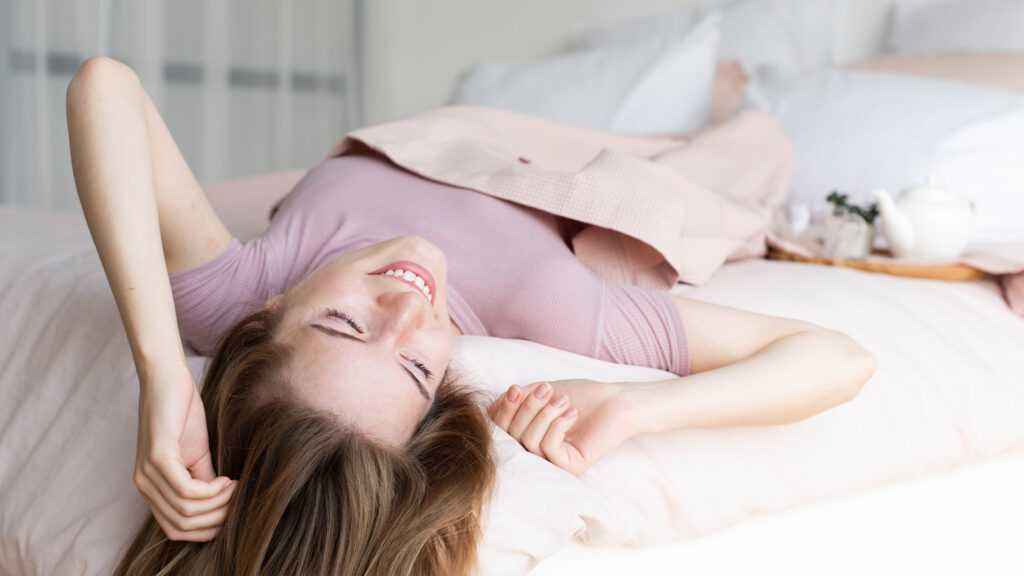
There’s something undeniably comforting about snuggling up in bed, especially when the world outside is a whirlwind of deadlines, commitments, and over-scheduling. The latest TikTok trend, “hurkle-durkling,” a quirky term with Scottish roots, seeks to balance a harried existence with one prioritizing rest and relaxation.
Originating from the old Scottish phrase “hurkle-durkle,” it means to lounge in bed when you should be up and about. But this trend may have more profound implications than just a fun fad. After all, stress and burnout rates in the workplace have been increasing for over a decade and are at a historical high, according to Gallup’s annual report on the state of the workplace in over 116 countries. (1)
Hustle culture seems to be losing its charm, especially among the social media-savvy Gen Zers, but when it comes to laying in bed, balance is key. “While rest is important, excessive prioritization of rest could lead to procrastination and avoidance of responsibilities. It’s essential to strike a balance between rest and productivity,” says Dr. Sanam Hafeez, a Neuropsychologist and the Director of Comprehend the Mind in New York City.
Self-care that promotes staying in bed all day as a cure-all for burnout, stress, and other potential psychological issues may put you at risk for other health concerns. Ahead, we’ve sought the expertise of Clinical Psychologist Aura De Los Santos and Dr. Hafeez for insight on the pros and cons of “hurkle durkling”.”
Benefits and Drawbacks of Hurkle Durkling
Hurkle-durkling, while a fun trend, can have implications for mental and physical health.
Starting with the positives, both experts agree that rest is essential for overall health. “Sleep is fundamental for the body to function well, so resting helps the mind to relax and unload stress and helps the body to be more relaxed and energized,” says De Los Santos.
Dr. Hafeez adds that adequate rest encourages work-life balance, fosters creativity and productivity, and improves physical health by allowing the body to recover and repair itself.
According to De Los Santos, resting can be a form of self-care, as it gives the body something it needs for recovery. Dr. Hafeez adds that prioritizing rest can also be an act of self-compassion and self-kindness, nurturing a greater sense of balance, acceptance, and general well-being.
However, there’s a flip side to be aware of, and as with most things, balance is key. Oversleeping can cause the opposite effect, according to De Los Santos, leading to feelings of lethargy rather than rejuvenation. Dr. Hafeez warns that excessive prioritization of rest could lead to procrastination, hinder progress toward personal and professional goals, and even have financial implications if it interferes with work or career advancement opportunities.
Another warning sign of excessive or mindless lying in bed is that it can indicate more serious depression or burnout. Symptoms of depression include sleeping long hours, being unable to fall asleep, neglecting personal hygiene, and irritability when woken up, while burnout symptoms include trouble falling asleep, tossing and turning in bed, and feeling stressed due to lack of rest, according to De Los Santos.
Dr. Hafeez adds that signs of depression or burnout can also include loss of interest in enjoyable activities, changes in appetite or weight, emotional exhaustion, increased irritability, and neglecting personal needs.
While hurkle-durkling can be a form of self-care and relaxation, it’s important to practice it with balance and mindfulness to avoid potential negative impacts on your mental and physical health.
How To Prioritize Rest With Balance and Mindfulness
Practicing hurkle-durkling can be an enjoyable way to unwind, but it’s essential to approach it with a sense of balance and mindfulness.
Taking breaks to rest and recharge enhances productivity and creativity by improving focus, concentration, and cognitive function. Embracing rest as an act of self-compassion and self-kindness nurtures a greater sense of balance, acceptance, and overall well-being in daily life.
Listening to your body’s signals is the best way to practice rest and recovery in a balanced way. “Rest allows the body to undergo essential processes of repair, muscle growth, and immune system strengthening, contributing to physical health and vitality,” says Dr. Hafeez. If you’re tired, stressed, or overwhelmed, it might be your body’s way of telling you it’s time for a break. Dr. Hafeez suggests responding to these signals with compassion and care and allowing yourself the rest you need.
Setting clear boundaries is another aspect of practicing hurkle-durkling mindfully, according to the experts. This could mean defining your limits and priorities regarding rest and self-care and communicating these boundaries assertively and respectfully to others, says Dr. Hafeez. For instance, De Los Santos recommends setting aside specific times for rest, such as an afternoon nap, and ensuring that others respect these times. “Create a sleep routine and try to dedicate the necessary hours to get a good night’s sleep,” she says.
Having intention is also essential, so reflect on what you hope to achieve or experience during your moments of relaxation and rejuvenation. Dr. Hafeez suggests choosing activities that align with your intentions and support your overall well-being — using your rest time to engage in activities that you find relaxing and enjoyable — such as reading a book, listening to music, or simply enjoying the quiet.
Engage fully in each moment of rest and self-care, and allow yourself to savor the sensations, pleasures, and simple joys of the present moment. “Allow yourself to savor the present moment’s sensations, pleasures, and simple joys. Practice gratitude for the opportunity to rest and recharge,” says Dr. Hafeez.
While hurkle-durkling has its merits and is certainly an appealing antidote to an overly stressful life, it’s important to approach it with a sense of balance and mindfulness. Listen to your body’s signals, set clear boundaries, have intention, and enjoy the moment. If you feel your desire to rest is taking over your life, or you feel disconnected or unhappy, reach out to your healthcare provider for advice.
Sources
1. Gallup, “State of the Global Workplace: 2023 Report,” Gallup Polls; https://www.gallup.com/workplace/349484/state-of-the-global-workplace.aspx; 2024.
Hafeez, Sanam. Author interview. February 2024.
De Los Santos, Aura. Author interview. February 2024.



























